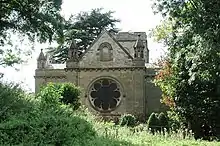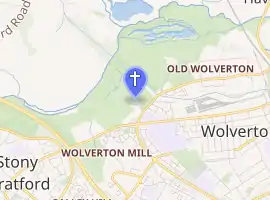Holy Trinity Church, Wolverton
The Church of the Holy Trinity is a Grade II* listed church, incorporating Saxon and medieval elements, located in the town of Wolverton, Buckinghamshire, England.[1] The modern church was rebuilt between 1809 and 1815.
| Holy Trinity Church, Wolverton | |
|---|---|
 Holy Trinity Church, Wolverton | |

| |
| 52°03′51″N 0°49′47″W | |
| Location | Wolverton, Buckinghamshire |
| Country | United Kingdom |
| Denomination | Church of England |
| Architecture | |
| Style | Gothic Revival |
| Years built | 1809–1815 |
| Administration | |
| Parish | Wolverton |
| Clergy | |
| Rector | Revd Gill Barrow-Jones |
History
The Church of the Holy Trinity is the original parish church of the Saxon settlement of Wolverton and overlooks the valley of the Ouse river, near the site of the Norman motte-and-bailey castle.[2]
In the early 19th century the old medieval building was replaced by a new church, begun in 1809 and completed in 1815.[2] The new church incorporates the 14th-century central tower of the old church, but this was re-cased in new masonry.[3][2]
The new stonework used Warwickshire sandstone, brought in from Attleborough, and was brought to the site by barge on the recently opened Grand Junction Canal.[3]
Next door to the church is a house built in 1729, which later became the vicarage; the front door has stonework from the nearby, demolished manor house of the 16th century, including the de Longueville family coat of arms, and pieces from the earlier church building.[4]
The church was Grade II* listed on 12 June 1953.[1]
Holy Trinity today
The rector is The Revd Gill Barrow-Jones.[5]
Churchyard
Among those buried in the churchyard are the stone mason George Wills, grandfather of the chemist George S. V. Wills.[6]
Sources
- Historic England. "Church of the Holy Trinity (Grade II*) (1125323)". National Heritage List for England. Retrieved 21 August 2019.
- "Parishes : Wolverton". A History of the County of Buckingham: Volume 4. Victoria History of the Counties of England. 1927. p. 505–509. Retrieved 17 February 2019.
- Official history Retrieved 8 March 2019
- Woodfield, Paul (1986). A guide to the historic buildings of Milton Keynes. Milton Keynes: Milton Keynes Development Corporation. p. 172. ISBN 978-0903379052.
- Official site
- findagrave Retrieved 9 March 2019
External links
- Official site Retrieved 8 March 2019
- Official history of Holy Trinity Wolverton Retrieved 8 March 2019